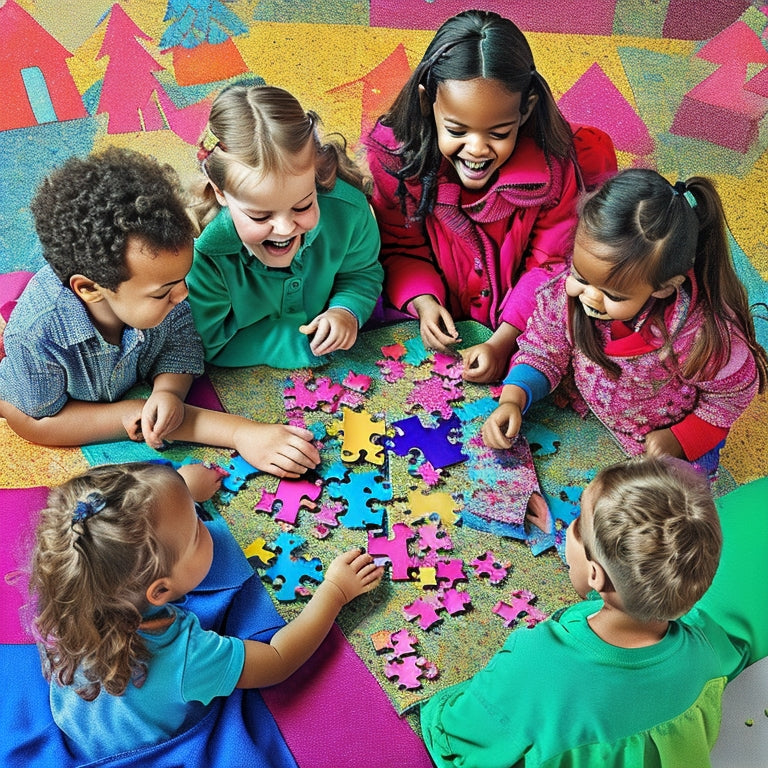
Mixture Beginners Learning Puzzles: Fun Time Game Book for Kids
Share
In the vast ocean of educational resources, a shining star emerges: the 'Mixture Beginners Learning Puzzles: Fun Time Game Book for Kids'.
Like a beacon of knowledge, this comprehensive puzzle book illuminates the path to learning for young learners. With over 100 pages of captivating puzzles, it offers a delightful combination of jumble words and Sudoku, tailored for beginners.
This full-color softcover paperback, adorned with glossy print, beckons children to embark on a journey of discovery. But this book is not just a source of entertainment; it is a tool for mental growth. Word puzzles enhance problem-solving abilities and foster competitiveness while strengthening analytical and logical skills.
Delivered with utmost care, this puzzle book is a perfect gift option, providing hours of stimulating entertainment and instilling self-esteem in young minds. Dive into the depths of fun and education with the 'Mixture Beginners Learning Puzzles: Fun Time Game Book for Kids'.
- The book contains over 100 pages of captivating puzzles, including jumble words and Sudoku.
- Engaging in puzzles helps children develop focus and problem-solving abilities.
- Word puzzles improve problem-solving skills and challenge individuals to think outside the box.
- Introducing Sudoku to young children can be a fun and educational experience.
What's Inside
The book 'Mixture Beginners Learning Puzzles: Fun Time Game Book Contains Jumble Word and Sudoku for Kids' contains over 100 pages of math-related puzzles, including word puzzles and sudoku puzzles ranging in difficulty. Incorporating educational games in children's learning is of great importance as it not only makes the learning process more enjoyable but also enhances cognitive skills in young learners.
Puzzles, such as word scrambles, can improve problem-solving abilities and competitiveness, while sudoku puzzles can enhance analytical and logic skills. By engaging in these puzzles, children can develop their focus and problem-solving abilities, ultimately building their self-esteem.
This book provides hours of stimulating entertainment and fun, making it perfect for beginners. With its well-designed puzzles and simple instructions, this book offers quality puzzles that can't be found anywhere else, making it a valuable resource for young learners.
Benefits of Word Puzzles
Word puzzles have been shown to enhance cognitive abilities and promote mental agility in individuals. Cognitive development through word puzzles is achieved by engaging the brain in problem-solving activities, which require critical thinking and logical reasoning.
These puzzles help to improve problem-solving skills by challenging individuals to find solutions and think outside the box. By deciphering jumbled words and solving Sudoku puzzles, children can develop their analytical skills and enhance their ability to strategize and make decisions.
Additionally, word puzzles provide a fun and engaging way for children to expand their vocabulary and improve their spelling skills. Overall, incorporating word puzzles into learning activities can have significant benefits for cognitive development and problem-solving abilities in young learners.
Sudoku for Beginners
Sudoku, a popular puzzle game, offers a stimulating challenge for novice players. It is a great way to introduce young children to the world of puzzles and problem-solving. Here are some tips for solving beginner sudoku puzzles:
-
Start with the easiest puzzles: Beginner-level sudoku puzzles have fewer numbers filled in, making them less intimidating for beginners.
-
Use the process of elimination: Look for numbers that can only fit in one particular cell based on the numbers already placed in the row, column, and 3x3 grid.
Introducing sudoku to young children can be a fun and educational experience. Here are some ways to do it:
-
Start with a 4x4 grid: Young children may find it easier to start with a smaller grid before moving on to a traditional 9x9 grid.
-
Use colorful markers or stickers: Make the puzzle more visually appealing by using colorful markers or stickers to fill in the numbers.
By following these tips, beginners and young children can enjoy the benefits of sudoku while developing their analytical and problem-solving skills.
Frequently Asked Questions
How long does it take to complete the puzzles in the book?
To effectively engage children in puzzle-solving activities, it is important to provide age-appropriate challenges that stimulate their problem-solving skills. Incorporating puzzle games in children's learning curriculum can enhance critical thinking, cognitive development, and foster perseverance. These activities promote logical reasoning, concentration, and creativity while providing an enjoyable learning experience.
Are the puzzles in the book suitable for children of all ages?
Introducing puzzles to children at a young age has several benefits. Puzzles help improve problem-solving skills and cognitive development. They promote critical thinking, logical reasoning, and spatial awareness, while also enhancing memory, concentration, and hand-eye coordination.
Can the book be used as an educational tool in classrooms?
Puzzle games can be valuable tools in the classroom. Teachers can incorporate them into lesson plans by using puzzles to reinforce key concepts, promote critical thinking, and encourage collaboration. Other ways to make learning engaging include incorporating hands-on activities, interactive technology, and real-world examples.
Are there any solutions provided for the puzzles in the book?
Solving puzzles can benefit children's cognitive development by improving problem-solving abilities, analytical skills, and focus. Parents can encourage their children to enjoy puzzle solving activities by providing age-appropriate puzzles, offering support and guidance, and making it a fun and rewarding experience.
Is there a limit to the number of times a child can play the word jumble puzzles?
Alternative ways to engage children in word jumble puzzles include creating themed puzzles, using visual aids or manipulatives, and incorporating technology. Word jumble puzzles help improve children's cognitive skills by promoting problem-solving, critical thinking, and vocabulary development.